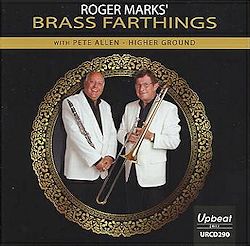 BUY NOW AmazonUK AmazonUS |
ROGER MARKS’ BRASS FARTHINGS WITH PETE ALLEN Higher Ground |
1. Lady of Spain
2. It Happened in Monterey
3. Maori Farewell
4. C’est Si Bon
5. An Ordinary Copper
6. Star of the County Down
7. Trouble in Mind
8. Higher Ground
9. Answer Me
10. Faithful Hussar
11. Old Rugged Cross
12. Jules’ Rag
13. Kentucky Home
14. Streets of the City
15. La Vie en Rose
16. White Cliffs of Dover
Roger Marks – Trombone (all tracks except 5 and 12), vocal (track 7)
Pete Allen – Clarinet, baritone sax (all tracks except 12), vocal (track 2)
Pete Sumner – Banjo (all tracks), vocal (track 10)
David Holdsworth – Sousaphone, trumpet (all tracks),
Recorded at Plymouth Music Cooperative Studios, U.K. on Oct. 29, 2018.
This small group album provides some first-rate traditional jazz. The program—perhaps one of the first things we look at when appraising a CD—shows only a few titles that are fairly often seen on jazz CDs— Trouble in Mind, Higher Ground, Old Rugged Cross, [My Old] Kentucky Home, and Streets of the City, perhaps. Others have appeared on occasion elsewhere to be given a jazz treatment—C’est Si Bon, Faithful Hussar, La Vie en Rose by Mr. Armstrong, for instance, or White Cliffs of Dover by British bands such as those of Chris Barber, Acker Bilk, et al. I do not recall any jazz groups taking up the remainder: Jules Rag, an original by Pete Sumner; An Ordinary Copper, which I have not heard before, the theme song of an early BBC TV series; It Happened in Monterey, a ballad from the movie King of Jazz that featured Paul Whiteman and his band and perhaps more associated with big swing bands; Star of the County Down, an Irish reel given a jaunty treatment, complete with hand-clapping fills; Answer Me, a ballad connected to the likes of Frankie Laine and Nat King Cole. So right out of the gate almost half of the tunes sparked my interest before I even put on the earphones.
Next comes the challenge of how well the quartet maintains the listener’s attention since there is only about half of the usual complement (seven or eight musicians) that provides the customary line-up of ensembles and solos. This combo does not fall short in this regard, providing a wealth of arrangements and textures that forestall any monotony. To cite just a few of these, the group does not follow the same pattern from track to track of ensemble, solos (usually in the same order), and ensemble out. Thus we find An Ordinary Copper commences with clarinet lead and maintains that until the end, there being no other solos. Or Higher Ground opens with a trombone and clarinet duet, trombone leading and clarinet playing counterpoint with no rhythm backing; then they are joined by sousaphone for a chorus and then banjo to complete the ensemble. Or Jules’ Rag begins with banjo and sousaphone and continues that duet for the entire track. So there is considerable variety here.
Solos within each track do not always follow the same order—sometimes the trombone takes the first, other times the clarinet. And both Marks and Allen are masters of their instruments, not only in terms of technique but also in the quality of the tone each achieves on his instrument, the trombone being warm and full, the clarinet having no sharp edges or screeches. And it goes without saying that both produce a wealth of ideas as we might expect, given their experience.
In addition to all of that, other factors contribute to the excellence of the rendition of each tune.
Lady of Spain maintains the rhythm of the tango throughout, where other bands might have resorted to straight fours. Maori Farewell (perhaps better known as Now Is the Hour), usually played in waltz time, is here taken in four from the outset until the coda. Jules’ Rag has an unexpected, but interesting, half time four-bar phrase on the banjo in the middle. And several tracks end with a four or eight bar turnaround.
All of this adds up to a very entertaining and enjoyable listening experience. This disc would be welcome on any jazz lover’s shelf.
Bert Thompson